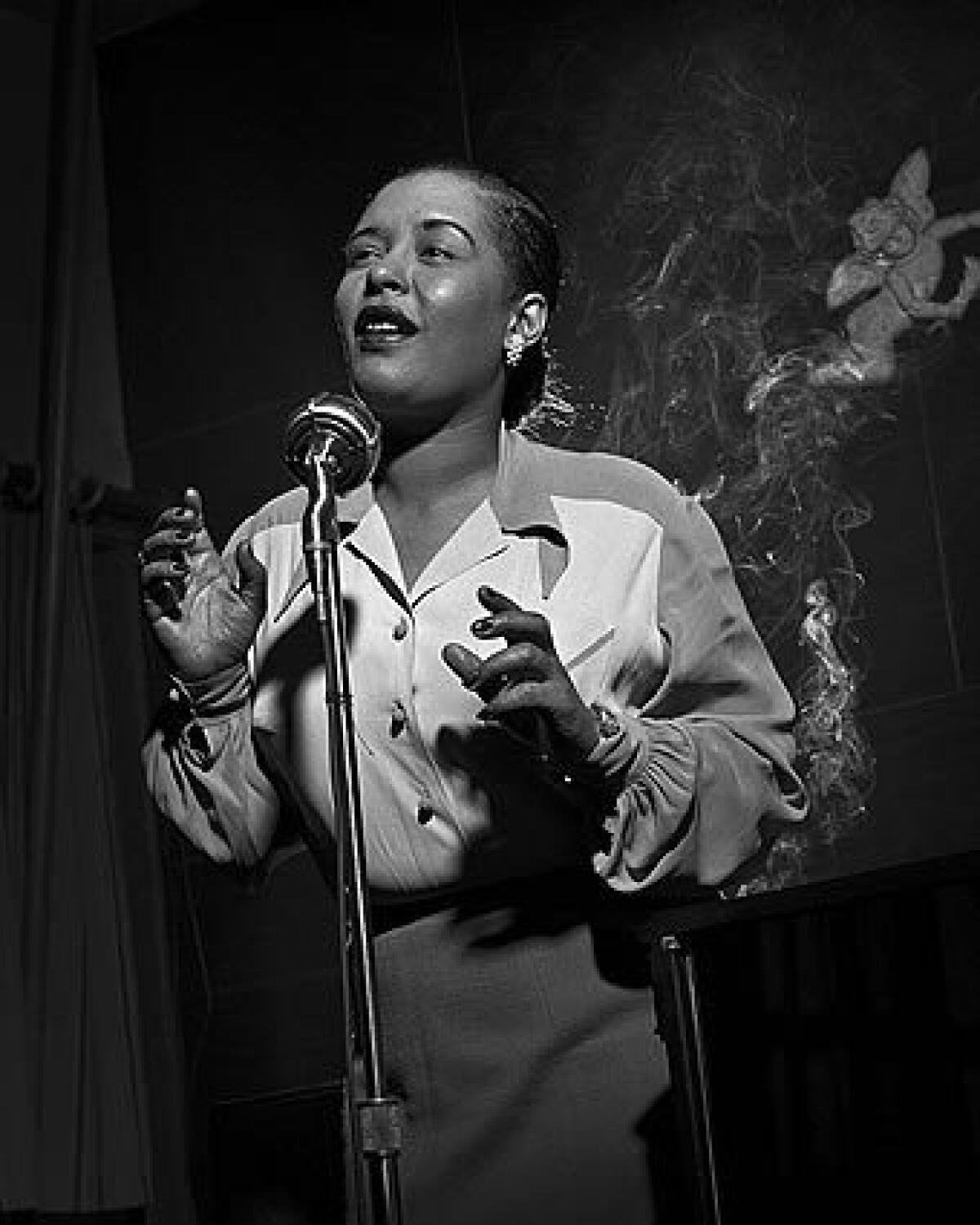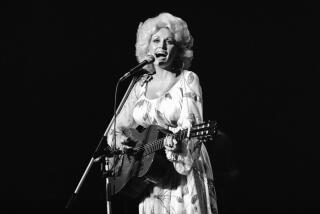What really happened when federal officers persecuted Billie Holiday

When the Pulitzer Prize-winning playwright and screenwriter Suzan-Lori Parks was little and her parents put on Billie Holiday records, they often offered a vague editorial as accompaniment.
“They would say things like, ‘They got to her’ — but without any specifics,” says Parks during a conversation about her script for “The United States vs. Billie Holiday,” the new Lee Daniels-directed movie. “My dad was in the military, and as parents were very slow to criticize the government.”
The drama, which premiered Friday on Hulu, is based on Holiday’s years-long battle with federal drug agents obsessed with both her heroin addiction and her star-making rendition of the harrowing ballad “Strange Fruit.”
Writer Suzan-Lori Parks and director Lee Daniels present Lady Day as an early civil rights activist in “The United States vs. Billie Holiday,” starring Andra Day.
As Parks — best known for her plays “In the Blood” (1999), “Topdog/Underdog” (2001) and 2019’s “White Noise” and her screenplay for Spike Lee’s “Girl 6” — grew older, she began to understand what her parents meant by “they” and “got to her.”
“I could see around me many Black American people whose excellence was rewarded with very harsh treatment by the government, or the system in Hollywood, or the theater system or whatever,” Parks says. She added, “I did the math and realized it must have had something to do with the status quo, you know? The powers that be must have had some hand in Billie Holiday’s downfall.”
“The United States vs. Billie Holiday” indicts the institutional racism that caused that downfall and does so through the story of a brilliant American artist whose “Strange Fruit,” about a lynching in the South, remains as haunting today as when it was released more than 80 years ago.
Starring Andra Day as Holiday, the work is based on a chapter from “Chasing the Scream: The First and Last Days of the War on Drugs,” a 2015 nonfiction book by Johann Hari. Called “The Black Hand,” the chapter documents the real-life circumstances of, as Hari writes, “how Billie Holiday entered the drug war.”
The chapter involves Harry Anslinger, who was a hard-charging drug enforcement agent in J. Edgar Hoover’s FBI who, Hari writes, “did more than any other individual to create the drug world we now live in,” and the ways in which he targeted Holiday. By the time Daniels’ film begins, Holiday has already lived with the success of “Strange Fruit” for nearly a decade.
Told through Holiday’s experiences as the most charismatic singer of her generation, who also happened to be addicted to heroin, the film addresses the ways in which Anslinger (Garrett Hedlund) used both that addiction and a Black FBI agent named Jimmy Fletcher (Trevante Rhodes) as cudgels in his quest for power and prestige in the department.
“The core of the story was all on the table: ‘The United States vs. Billie Holiday’ — not ‘The Billie Holiday Story,’” Parks says. “Jimmy Fletcher is literally, actually an agent for the United States and she falls in love with him. To me, this is all about how we love this country and it dismisses us, and how for Black people, the fastest route to being an American is to throw someone of color under the bus. Whatever your race, actually.”
When Daniels read that chapter and Parks’ script, he saw that the Holiday portrayed in “Lady Sings the Blues,” the 1972 biopic starring Diana Ross, didn’t pursue that strand of Holiday’s narrative. “I found out that that wasn’t the real story, that Billie Holiday was a civil rights leader, that she wasn’t just a drug addict or a jazz singer,” Daniels recently told The Times.

Billie Holiday singing “Strange Fruit.”
Although some details of the relationships have been fictionalized for the film, the actions, indictments, convictions and conspiracies are well documented.
In 1947, Holiday was 32 and near the peak of her powers. Raised under harrowing circumstances in Baltimore, Holiday signed to a record label before she was 20 and across the 1930s became known for singing songs about failed love and shattered hopes. She was also a heroin user, a heavy drinker and a victim of rape and domestic violence at the hands of various men.
She fully embodies these horrifying experiences on the recording of “Strange Fruit,” songwriter Abel Meeropol‘s 1939 protest song. Though its lyrics don’t explicitly decry a lynching, each line evokes its putrid essence.
In the film, Day sings it after viewers have already witnessed Holiday overwhelm rapt crowds in 1940s New York with her singular phrasing and tone; and watched her shoot up and get beaten down, only to stand on stage the next night, singing the blues.
Daniels shows her singing “Strange Fruit” in close-up, moaning through lines about “a fruit for the crows to pluck / For the rain to gather, for the wind to suck / For the sun to rot, for the trees to drop / Here is a strange and bitter crop.”
In Lee Daniels’ ‘The United States vs. Billie Holiday,’ the ‘Rise Up’ and ‘Burn’ singer summons the singular style of an icon.
That Holiday’s recording of “Strange Fruit” became a hit was no small feat during a year in which the three biggest songs were Judy Garland’s “Over the Rainbow,” Kate Smith’s “God Bless America” and Glenn Miller’s “Moonlight Serenade.” The song resonated not just among jazz-loving cosmopolitans, but across the country. Daily newspapers in the prairie states and on the West Coast listed it in their hit parade columns. The Lexington Herald in Kentucky described it as a “weird, minor key lament.”
After its release, musicians and peers praised it as a landmark. Former Los Angeles Times jazz critic Leonard Feather described it as “the first significant protest song in words and music, the first unmuted cry against racism.” As author Julia Blackburn noted in her book “With Billie,” jazz drummer Max Roach declared it “more than revolutionary. She made a statement that we all felt as black folks. No one was speaking out. She became one of the fighters, this beautiful lady who could see and make you feel things.”
“Strange Fruit. I gotta be pretty high to sing that one,” the singer says in “The United States vs. Billie Holiday” when a fan requests it during a performance.
Notably, Anslinger hated the song and used the power of the U.S. government in an attempt to cut her off. As reported in newspapers of the time, Holiday’s arrest, trial and imprisonment occurred across less than two weeks in late May 1947. An Associated Press story reporting on the arrest, which occurred after a raid at a Philadelphia nightclub, called it “a sordid tale of narcotics addiction [that] unfolded in the U.S. District Court.”
A columnist in the New York Daily News reported that “Federal agents will be cracking down on other musicians on the same drug charges that snared Billie Holiday.” Cocaine-fiend bassoonists and stoner flutists need not have worried, though. According to “Chasing the Scream,” drug enforcer Anslinger during congressional testimony “reassured congressmen that his crackdown would not affect ‘the good musicians but the jazz type.’”
At the trial, though, rather than decry Holiday as a danger to society, the prosecutor described her as a victim of “the worst type of parasite you can imagine,” and accused heroin dealers of following her around and overcharging her for her drugs. But rather than defend her, Holiday’s lawyer suggested she plead guilty and said that she’d likely get probation and be sent to a hospital to treat her addiction.
Instead, the judge sentenced her to a year and a day in prison and told her that, according to the AP story, “the government was going to give her ‘benevolent’ treatment at the reformatory.”
For Parks, who studied with writer James Baldwin and has addressed issues of race, power and art in work across her creative life, Holiday’s complicated relationship with her most popular and important song stands to reason. After all, who wants to stand on stage and get an ovation after singing a song about Black men hanging from nooses?
Asked if she and Baldwin ever discussed Holiday or “Strange Fruit,” Parks pauses to think.
“No, but we talked about the task of the artist, the calling,” she says. “When we’re called, we have to answer the call. And it might be difficult and it might be dangerous and it might not make us rich, but it is our life’s work to answer the call.”
Adds Parks: “And I think Billie Holiday answered that call. She demonstrated some of the things that Mr. Baldwin was talking about. That fearlessness. That, ‘I’m going to speak truth to power and do what’s perhaps unpopular, or less than popular, because this is the ground on which I stand.’”
More to Read
The biggest entertainment stories
Get our big stories about Hollywood, film, television, music, arts, culture and more right in your inbox as soon as they publish.
You may occasionally receive promotional content from the Los Angeles Times.












